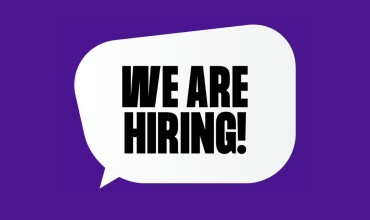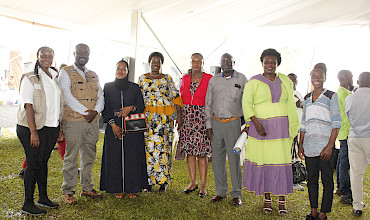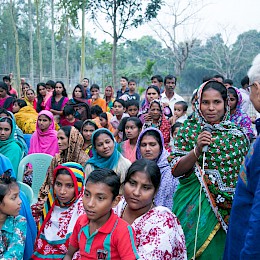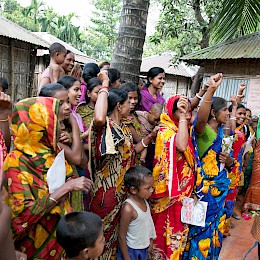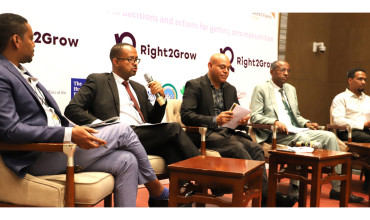
In a captivating five-day workshop, Right2Grow hosted a groundbreaking learning event that unfolded from November 20th to 25th, 2023, in Kampala-Uganda. Marking a historic milestone, this event pioneered the physical gathering of 80 Right2Grow members hailing from various operational countries of the programme. Over the course of these five days, the event evolved into a hub of shared knowledge, a platform for celebrating achievements, and a dynamic space for strategic planning.
Day One: Mid-Term Review
As John Dewey rightly articulated, "we do not learn from experience. We learn from reflecting on experience." In alignment with this viewpoint, the opening day of the event established its foundation through a comprehensive mid-term review, highlighting the importance of learning from mid-term review findings specific to each country. This session encompassed detailed presentations covering the mid-term review's objectives, process recaps, essential conclusions, and recommendations. Pivotal decisions emerged, emphasising dedicated commitments to strengthen private sector engagement, development of a roadmap expounding the tangible implementation of the humanitarian-development-peace Triple Nexus and prioritising the development of a comprehensive transition and sustainability plan.
Day Two: Acknowledging Success
The second day was a unique celebration of successes and acknowledgment of setbacks across the consortium's six countries. Through posters and videos, each country shared their proudest achievements and embraced failures as stepping stones to success. Ibrahima Dembele from ACF Mali captured the spirit, stating,
This second day helped us to appreciate our successes but also to become aware of our failures. This week of learning has been the best because I've learnt that failure shouldn't frighten me, because it's the beginning of success.
Day Three: Connecting
The objective of the third day centered on fostering and fortifying connections among Right2Grow members through a series of interactive activities such as games, group discussions, and peer-to-peer learnings. These engaging exercises were purposefully crafted not only to establish and enhance interpersonal links but also to collectively explore the connections between Gender and Hunger. Participants shared their diverse experiences related to the programme's cross-cutting themes, and the day served as a platform to analyse and refine collaborative approaches to optimise collective efforts. Following these insightful engagements, partners committed to reinforcing gender-sensitive and transformative initiatives. For instance, Mali expressed its intent to enhance community capacity in transformative gender practices, advocate for women's access to secure land and agricultural spaces, and raise awareness among men to alleviate women's workload. The day's activities stressed the importance of combined efforts in ensuring women's involvement in political, economic, social, and organisational leadership positions through a gender transformative approach to address issues of food insecurity.
Day Four: Bridge4Voices
Focused on the foundational Bridge4Voices (B4V) approach, Day Four aimed to unify all participants under this approach. B4V serves as the cornerstone upon which the Right2Grow Alliance builds its endeavors. Although collaboratively created to steer the programme's efforts, there was still a need for alignment among all partners. The B4V day was designed to achieve consensus on the approach, assess its current implementation, and chart a roadmap for its integration throughout the remaining programme duration. This dedicated day also played a crucial role in refining our international Lobby and Advocacy (L&A) priority areas, ensuring better alignment with the programme's objectives in each country. Colleagues collaborated on strategies to improve coordination, explore connections between national and international priorities, and strengthen the generation of evidence.
Day Five: Challenge solving
The final day of the Learning Week was dedicated to drawing valuable insights from setbacks and collectively devising solutions to address key challenges, setting the stage for ongoing enhancements within Right2Grow in the coming years focused on the notion that "Failure is the Foundation of Success.".
The primary objectives encompassed engaging in group discussions to thoroughly analyse identified key and priority challenges, proposing potential solutions, and diagnosing these challenges within the specific country context.
In this context;
Burkina Faso committed to reshaping the private sector mindset, fostering social responsibility by capacitating local entrepreneurs to deliver community-level training for new entrepreneurs.
Mali pledged to advocate with the government for the creation/strengthening of a coordination framework and with donors for flexible funding in relation to the Triple Nexus.
Ethiopia committed to present evidence with a clear ask, view donors as partners, devise an inclusive advocacy strategy, and explore engagement with donor platforms.
South Sudan outlined plans for an improved and expanded mapping strategy targeting local entrepreneurship.
Uganda pledged to enhance resource access, create platforms for hands-on capacity building, collaborate with tier 1 and 2 members, and establish exposure spaces for tier 3 organisations.
Bangladesh committed to focusing on knowledge management, capacity building, utilization of data, and fostering collaboration and partnership.
The Right2Grow Global Learning Week 2023 not only fostered collaboration and shared learning but also laid the groundwork for overcoming challenges and realising the consortium's goal. As each partner country commits to these transformative actions, the impact is poised to ripple across borders, creating a positive and lasting effect on various communities.
Back to overview
